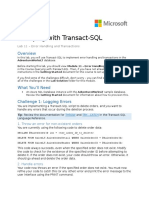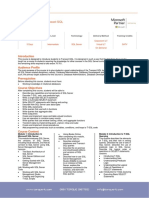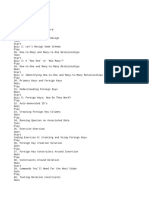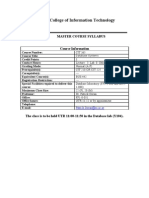0% found this document useful (0 votes)
21 views2 pagesQuerying With Transact-SQL: Course Prerequisites
The document provides a syllabus for a course on querying with Transact-SQL. The course consists of 11 modules organized into 4 sections to be completed over 4 weeks. It includes lectures, demonstrations, labs, and graded assessments for each module, with a final exam accounting for 40% of the overall grade. Students are expected to spend 4-5 hours per week to view materials and complete assessments. A discussion forum is provided for students to ask questions and help each other.
Uploaded by
Rehan BajwaCopyright
© © All Rights Reserved
We take content rights seriously. If you suspect this is your content, claim it here.
Available Formats
Download as PDF, TXT or read online on Scribd
0% found this document useful (0 votes)
21 views2 pagesQuerying With Transact-SQL: Course Prerequisites
The document provides a syllabus for a course on querying with Transact-SQL. The course consists of 11 modules organized into 4 sections to be completed over 4 weeks. It includes lectures, demonstrations, labs, and graded assessments for each module, with a final exam accounting for 40% of the overall grade. Students are expected to spend 4-5 hours per week to view materials and complete assessments. A discussion forum is provided for students to ask questions and help each other.
Uploaded by
Rehan BajwaCopyright
© © All Rights Reserved
We take content rights seriously. If you suspect this is your content, claim it here.
Available Formats
Download as PDF, TXT or read online on Scribd
/ 2
























































